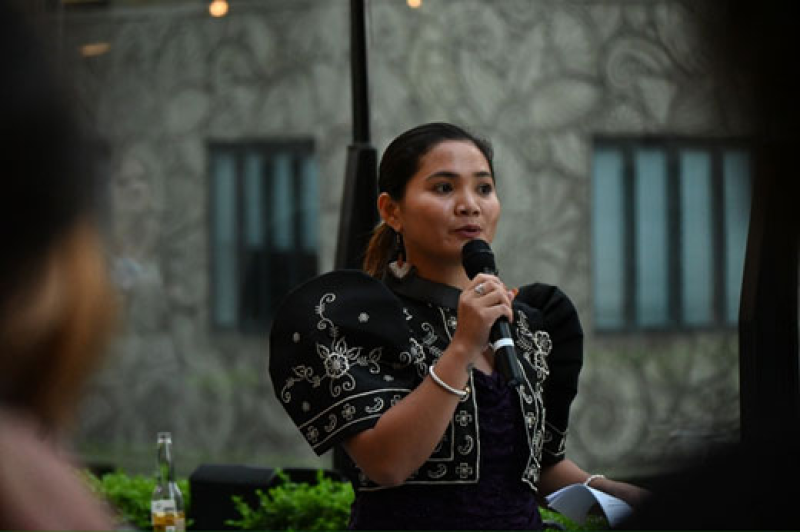- Depositors stranded as Sammilito Islami Bank is in liquidity crisis |
- BNP faces uphill task to reach seat-sharing deal with allies |
- Bangladesh rejects India’s advice; vows free, fair polls |
- Hadi’s condition very critical: Singapore Foreign Minister |
- Asia-Pacific hunger eases, Gaza pipeline fixed, Europe hit by flu |
Time to Make Polluters Pay for Climate Destruction

Marinel Ubaldo, climate activist from the Philippines, speaks at a Climate Week event hosted by Oxfam in New York City.
I was 16 when Super-Typhoon Haiyan tore through my community in Eastern Samar, Philippines. It remains one of the deadliest storms in history, killing over 6,000 people and displacing millions. My community lost everything: loved ones, homes, livelihoods, and a sense of safety—all vanished overnight.
That storm did not happen in isolation. Fossil fuel companies have worsened the climate crisis, increasing the frequency and intensity of disasters. Yet these companies have not paid for the damage. Instead, they have earned record profits while families, governments, and international donors have borne the costs.
Since Haiyan, I have worked with survivors, youth, and frontline communities across the Philippines and beyond, witnessing firsthand how climate disasters destroy homes, food security, and dignity. I have also seen fossil fuel corporations continue to profit while we pay the price. That is why I joined campaigns like Make Rich Polluters Pay. This demand is not charity—it is justice and accountability.
The science is clear: fossil fuel companies are responsible for roughly 75% of global greenhouse gas emissions. They have known for decades that burning oil, gas, and coal would destabilize the climate, yet they delayed action. In 2022 alone, fossil fuel companies made nearly $600 billion in after-tax profits.
Our demand is simple: tax these polluters for the damage they have caused, and channel the funds to the communities least responsible yet most affected by the climate crisis. Such a tax would correct a historic injustice and provide urgently needed resources for adaptation, loss and damage compensation, and a just energy transition.
It is not only fossil fuel companies that must be held accountable. Oxfam research shows that the richest 1% contribute more to climate breakdown than the poorest two-thirds combined. A wealth tax on millionaires and billionaires, alongside a permanent polluter profits tax, could raise trillions annually to fund renewable energy, support farmers facing drought, and ease the debt burdens of countries like mine.
This is not just an activist demand. A survey commissioned by Oxfam and Greenpeace across 13 countries, covering nearly half the world’s population, showed overwhelming support for taxing fossil fuel companies:
81% support taxing fossil fuel companies for climate damages.
66% say oil and gas companies—not ordinary workers—should cover disaster costs.
86% want revenues directed to communities most affected.
75% believe frequent flyers and private jet users should pay more.
77% would be more likely to vote for politicians prioritizing taxes on polluters and the super-rich.
Even in the United States, 75% support taxing oil and gas companies for climate damages, including 63% of Republicans. In the Philippines, support is 84%. We know what it means to lose everything while watching corporations profit from the fuels that heat our planet.
Momentum is growing. Nearly 40 former heads of state, including Ban Ki-moon, Mary Robinson, Vicente Fox, and Carlos Alvarado, issued a letter urging governments to adopt permanent polluter profit taxes. They argue these companies must contribute fairly to finance the energy transition and support those most at risk.
Oxfam analysis shows that a polluter profits tax on oil, gas, and coal companies could raise $400 billion in its first year—enough to fund renewable energy expansion, climate adaptation, and debt relief. Evidence shows it is feasible: during the 2022 oil price crisis, several governments implemented windfall taxes, and U.S. states like Vermont and New York passed legislation requiring fossil fuel companies to fund disaster response.
As world leaders return from the UN General Assembly to prepare for G20 talks in South Africa and COP30 in Brazil, the question is not whether this is possible—it is whether they will listen to scientists, the public, former leaders, and frontline voices like mine.
For me and millions living in the heart of this crisis, the message is clear: it is past time to make polluters pay.
Marinel Ubaldo is a climate activist from the Philippines and a founding partner of Oxfam’s “Make Rich Polluters Pay” campaign.

